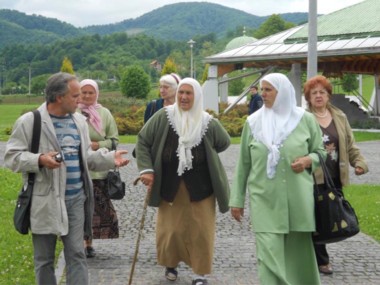As Yugoslavia split apart in the wake of the Soviet Union’s collapse, the breakaway state of Bosnia and Herzegovina suffered four years of cataclysmic horrors. A conflict over territory claimed by neighboring Serbia became a bloodbath of ethnic “cleansing” at the hands of Serbian-backed militias and vigilantes. In a nation that had been a model of religious tolerance, Bosnian Muslims were targeted by Orthodox Serbs who had been their neighbors. People were driven from their homes, men were herded into concentration camps and women forced into sexual slavery in the notorious “rape camps.” The atrocities climaxed in 1996 when some 8,000 men and boys were massacred in the town of Srebrenica.
Sarajevo, the Bosnian capital, resisted invasion and was besieged by the Serbian army for nearly four years—the longest siege of a major city in modern history. Few corners of the city were safe from the snipers who staked out positions on the surrounding hills overlooking the city.
“We could be killed any day, just going for water,” says one of the women portrayed in a new play. Written by Smith College professor Ellen W. Kaplan, it’s drawn from conversations she and director Peg Denithorne had last year with members of a Bosnian women’s collective known as Sarajevo Phoenix. That’s also the title of the play, which it receives its premiere staging here this week.
The group’s members represent the mix of ethnicities and religions for which Bosnia was once renowned. The collective was formed at the end of the war as a small cottage industry, producing hand-stitched embroidery for the international handicraft market. But it has also served as a place of healing and renewal for women traumatized by the brutal Serbian campaign. Kaplan showed me a photo (below) taken at the memorial to those massacred in Srebrenica. She is walking with translators Vjekoslav and Asra Saje and three members of the Phoenix group, whose heads are covered in the Muslim tradition. Those women, she explained, lost over 100 members of their families in the war.
Kaplan describes the play, which will also be performed in translation at the Theatre of Memory festival in Sarajevo, as “theater of witness,” meant to share the experiences of trauma survivors, “speak the unspeakable,” create spaces for “public mourning” and personal healing as well as platforms for historical lesson-learning. She and Denithorne see theater as a form of activism, challenging unjust circumstances while giving voice to the disenfranchised.
Most of the play’s dialogue is verbatim testimony of the Sarajevo Phoenix women. They reminisce about life pre-1992, recall moments of terror, deprivation and despair, and leaven the pain with laughter.
“There was no water, no toilet, nothing. Basically we did nothing. There was no music, no television, no electricity. You do without,” says one.
“My husband died. Why? He went to the corner to buy me cigarettes. He’s killed by a sniper. At our doorstep.”
“The first thing you think— how do I get water today? How do I get wood? Is there anything to eat?”
“After a while all this became normal. … You forget how to live a civilized life.”
“There’s a joke: Would you like a cup of coffee? No? Good! Then I can take a shower.”•
Sarajevo Phoenix: Jan. 24, 7 pm, Hallie Flanagan Studio Theatre, Mendenhall Center, Smith College, Northampton, smith.edu/smitharts, 585-ARTS (2787).
Contact Chris Rohmann at StageStruck@crocker.com.



